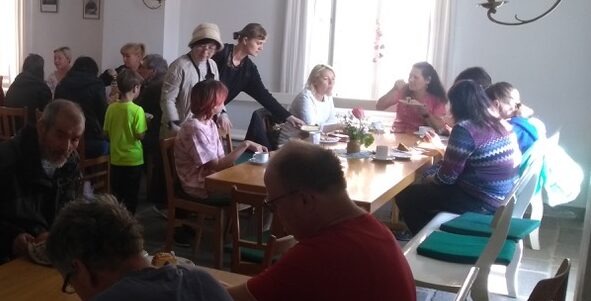(Members of the Moravian Church in Herrnhut, Germany provide hospitality for Ukrainian Refugees)
Compassion-Based Mission
By Bishop Chris Giesler
Preaching Text: Matthew 20:1-16
The truth is plain and simple: the Kingdom of God looks very different from the world in which we humans live, move, and have our being. It has been that way since the beginning of time. The text for this week’s Gospel lesson bears this out.
To begin grappling with this text, we must first remember that it is a parable, not a historical fact. Doing this lets us realize that the people and their behavior in the parable have been carefully chosen to illustrate a point. We must also note, at this point, that this parable appears only in Matthew’s Gospel. As such, the author chose it to teach a lesson that was somewhat unique to their audience. The most distinguishing factor of Matthew’s Gospel is that it was written primarily for a Jewish audience approximately 30 to 40 years after Jesus’ death and resurrection when the early church was still in its early stages of organization. The notion that Jews and Gentiles could co-exist in a religious community was still a novel idea. Perhaps this helps us to see why the parable is constructed as it is.
The parable tells of the owner of a vineyard who needs laborers to help harvest the crop. The owner goes early in the day to a place in town where the day laborers would assemble to hopefully be chosen to work that day. These day laborers lived day to day, counting on that sum of money to feed their families. A day without pay meant that family members might not have something to eat that night. As the parable unfolds, the first laborers are chosen early in the morning, and the day’s wage is agreed upon. Laborers are also sought at 9:00 AM, 12:00 PM, and again at 3:00 PM. But still, the entire crop had not yet been harvested, so at 5:00 PM, more hands were needed and thus recruited. We are not told what pay rate had been negotiated for the latecomers. Some commentaries note that the NRSV translation of verse 6 sounds a bit more accusatory than it should when the owner asks why, at 5:00 PM, these as-of-yet unhired workers have been “idle” all day. The NIV is not much better, suggesting that the workers have merely stood around. In his commentary on this passage, Dr. John Carroll suggests that a more accurate translation would have been that these workers had been “standing in the marketplace without work.” https://www.workingpreacher.org/commentaries/revised-common-lectionary/ordinary-25/commentary-on-matthew-201-16-9
These workers could have given up and gone home. Or worse yet, they could have hit the bar and spent what little money they might have had. But the truth is, these folks stayed, even to the last hour of the day, hoping they could have gone home with an hour’s pay rather than nothing.
When the day ended, those who had worked anywhere from one to twelve hours were asked to line up for their pay. Those who started last are invited to come to the front of the line to be paid and are given the same amount that those who began at 6:00 AM would then receive. Those who worked all day, much as we would, were indignant. And when they protest, the owner replies: “Take what belongs to you and go; I choose to give to this last the same as I give to you. Am I not allowed to do what I choose with what belongs to me? Or are you envious because I am generous?’ So the last will be first, and the first will be last.” (Matthew 20:14-16)
How might a real-life landowner have handled the delicate issue of dispensing the pay to those who worked for him that day without causing the grumbling that we see here? The owner could have easily paid those who worked the longer hours first, waited until they had moved on, and then quietly paid those who arrived at the 11th hour. As the parable is told in the Gospel, however, the owner asks explicitly that those who arrived last should be paid first to set the stage for the inevitable pushback. The author truly wants to make a point to his readers. While we might operate on the notion that those who work longer should get paid more, this owner has compassion for those who were not chosen first so that they too can go home and feed their families.
But something even more profound is happening here than an owner’s compassion for the latecomers. In his daily meditation from the Center for Action and Contemplation on September 18, 2023, Father Richard Rohr writes:
Each time I was recovering from cancer, I had to sit with my own broken absurdity as I’ve done with others at the jail or hospital or soup kitchen. The suffering person’s pain and poverty is visible and extroverted; mine is invisible and interior, yet just as real. The two sympathies and compassion connect and become one world. I think that’s why Jesus said we have to recognize Christ in the least of our brothers and sisters. It was for our redemption, our liberation, our healing—not merely to “help” others and put a check on our spiritual resume. Rather, when we see it over there, we’re freed in here, and become less judgmental. I can’t look down on a person receiving welfare when I realize I’m receiving God’s welfare. It all becomes one truth; the inner and the outer reflect one another.
https://email.cac.org/t/d-e-vthxn-tlkriltrdr-w/’
It is compassion that enables true mission in life. If mission is done to make one feel better about themselves or to gain a better grade in the “Book of Life,” then we are susceptible to spiritual pride and a notion of works righteousness. This vineyard owner’s mission was to ensure that each worker could go home and feed their family and see to their comfort.
Before embarking on a mission trip or deciding where and how much we should donate to any church and/or mission agency, we should also use the lens of compassion. By doing this, we stand a better chance of helping someone who has been marginalized and making ourselves whole. In this way, the Kingdom of God finds its place here on earth just as it is in heaven.







